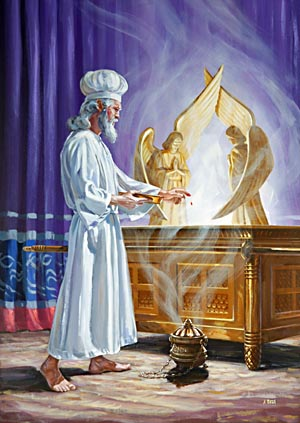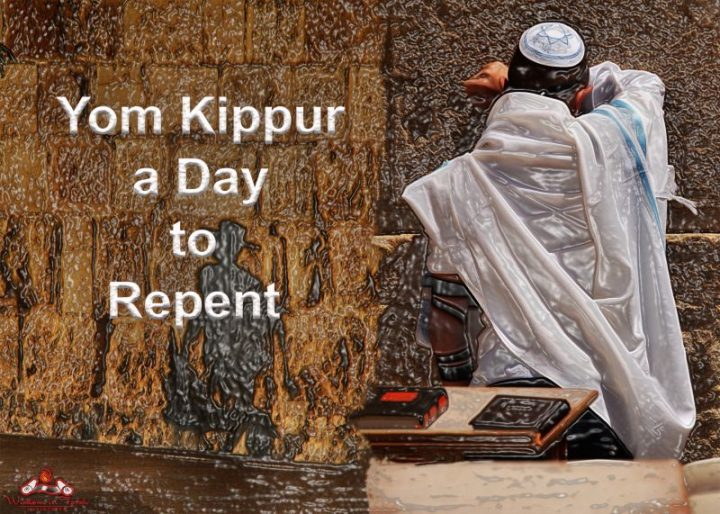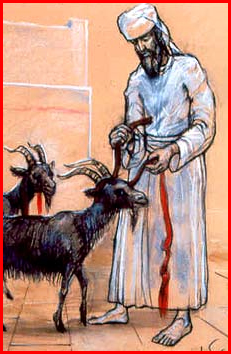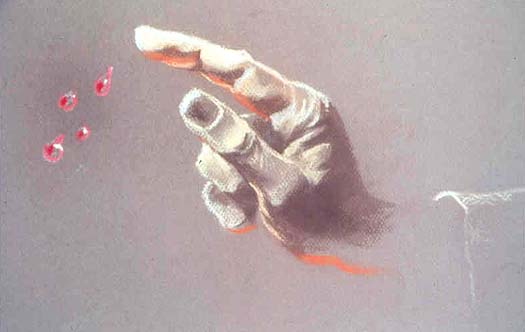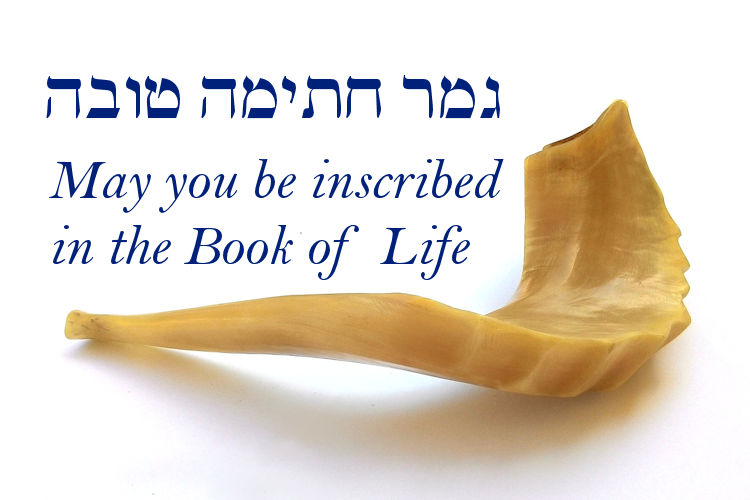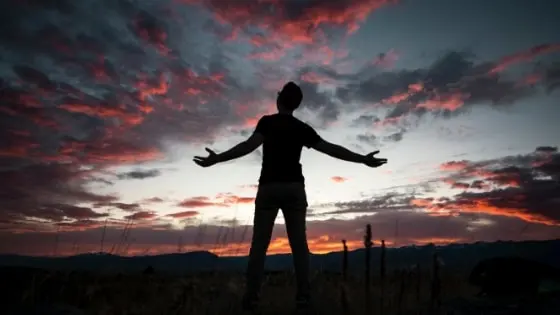Leviticus 16: Seven Reasons Why Yom Kippur Is Relevant to Christians Today
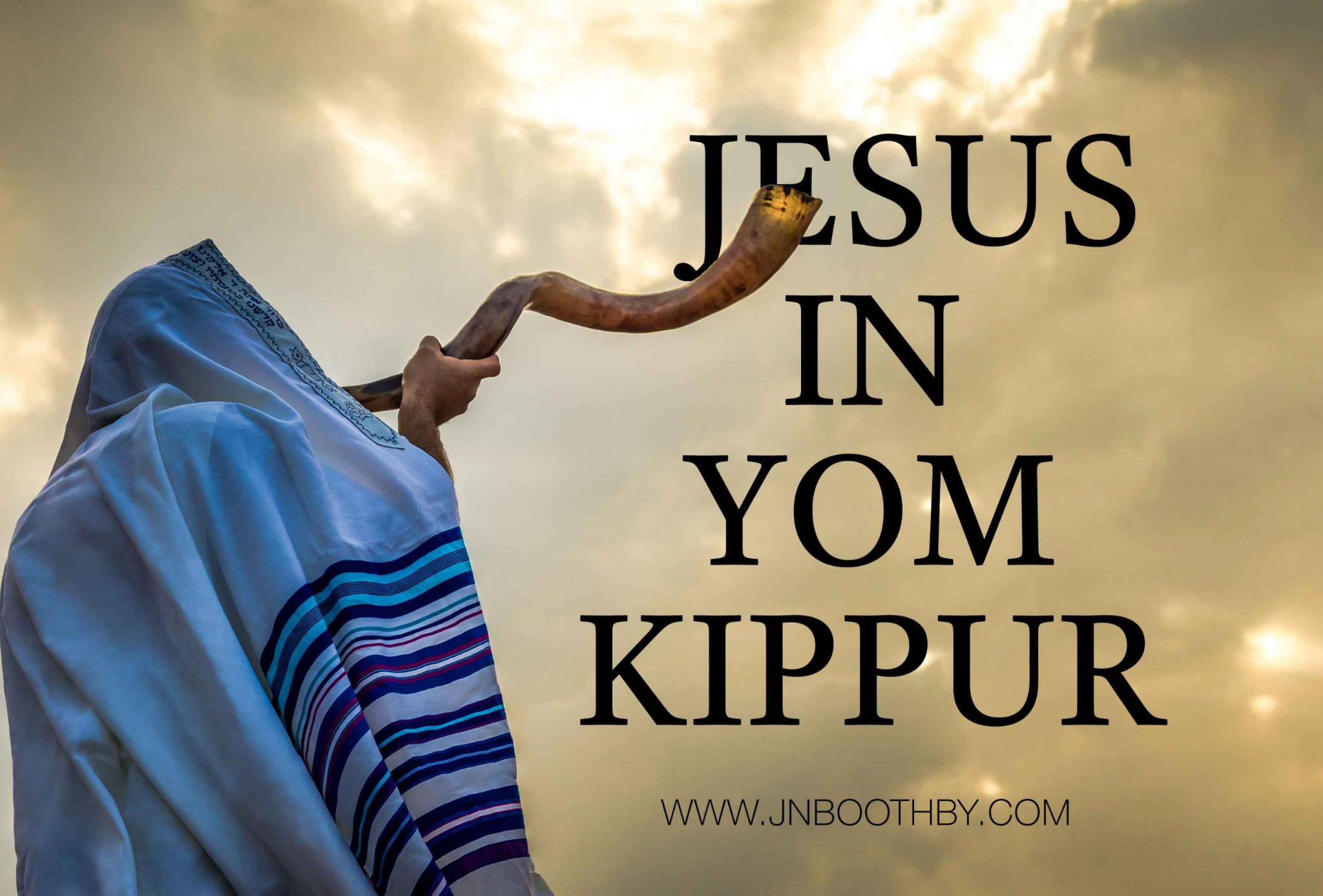
Image credit1
Introduction: Recognizing the Shadow of Christ in God’s Seven Holy Days. God’s holy days revealed the “shadows” of Christ (Col. 2:17). The “holy convocations” or “miqras” can also be translated as “rehearsals.” (Lev. 23:2). With the first four holy days, the Jews unknowingly rehearsed for the Messiah’s arrival. With the last three days, we rehearse for His return.
(1) Passover. Christ was the Passover lamb who died for us to allow judgment to “pass over” us (Isa. 53:7; Jo. 1:29; 1 Pet. 1:18-19). This day (“Good Friday”) is a day to stop and remember the terrible sacrifice that Christ paid for you so that death would pass you over.
(2) The Feast of Unleavened Bread. During this feast, Jesus was in the grave. Through Christ, we are freed from our sins, the “leaven” in our lives (1 Cor. 5:7; 6:13-20). This is the day to flee from the sins of your old lives the same way that the Jews fled from theirs in Egypt.
(3) The Feast of First Fruits. On this day (“Resurrection Sunday”), Jesus also rose from the grave and became the “first fruits” of those who were once dead (1 Cor. 15:20). This is a day to give thanks to Him and offer the first fruits of your life to Him (Ro. 12:1).
(4) The Feast of Weeks. On this day, God revealed His will for us by pouring out the Holy Spirit unto His believers (“Pentecost”) (Acts 2:3). This is a day to give thanks for the Holy Spirit and to discern God’s will for you through reading the Word and through prayer.
(5) Rosh HaShanah. Rosh HaShanah is God’s New Years’ Day. It is celebrated by the blowing of trumpets (Lev. 23:24-25). Rosh HaShanah was celebrated over two days because no one knew the exact date that it began. Some believe that this foreshadows the Rapture, the next event on the Christian calendar. Like Rosh HaShanah, the rapture will be preceded by the blowing of a loud trumpet (Matt. 24:31; 1 Cor. 15:52; 1 Thess. 4:16-17). Yet, no one knows the exact day or hour of His return (Matt. 24:36; Mk. 13:32). This is a day to renew yourself, make your vows to God for the year to come, to study the law, and to meditate about the Messiah’s return. Yet, we should live every day being ready for His return.
(6) Yom Kippur, the Day of Atonement. Yom Kippur is the day of atonement for sin (Lev. 23:26-32). It was a somber time for repentance and prayer for the sins of the nation. Those who failed to repent would face God’s judgment. This foreshadows the day of wrath when the Messiah will come to judge the nations (Joel 2:1; Rev. 8-9). This is a day to repent of your sins, give thanks for what Christ did for you, and to pray for the nations to repent.
(7) Sukkot, the Feast of Tabernacles or Booths. Sukkot was the last of God’s holy days. It was the most joyful of all. It celebrates when God came to dwell or “tabernacle” amongst us. It also foreshadowed both when Christ dwelled with us and when He will again “tabernacle” with us during His 1,000-year reign on Earth. This Feast celebrates God. It is a “perpetual statute throughout your generation. . . ” (Lev. 23:41). If you celebrate it, “your God will bless you in all your produce and in all the work of your hands. . .” (Dt. 16:15).
The seven lessons from Yom Kippur for Christians today. Once you understand that God’s seven holy days all foreshadow Christ, believers can find seven important lessons from the details regarding how God commanded the Jews to observe Yom Kippur. First, while the Jews could only approach God through their High Priest in the throne room on Yom Kippur, Christ’s death has given you direct access to God every day. Second, from the example of the High Priest, God instructs that Christians repent of their sins before they petition God in prayer. Third, through the example of the High Priest and God’s instruction that every believer is part of God’s “holy priesthood”, every believer is charged with the duty to pray for the nation. Fourth, from the example of the High Priests, He instructs believers to pray for forgiveness for the sins of the Church and for its purity. Fifth, from the comparison of the “scapegoat” used by the Jews to Christ, believers learn that their sins are not just forgiven, they are forgotten. Sixth, from the example of the High Priest, God instructs believers to stay “sanctified” or set apart for His use by constantly cleansing themselves from the sins of the world. Finally, from the freedom Christ has given us to petition God daily, believers are charged to pray for the nation on a frequent if not daily basis. At a minimum, Yom Kippur is an opportunity to for the united Church to come together out of devotion and not obligation to pray and fast as a body for the sins of the nation.
1. In Jesus’ Name, You Can Approach God with Boldness. Lev. 16:1-4, 17-18.
Christ is your daily advocate in the throne room of God. To atone for the nation’s sins, God declared: “1 Now the Lord spoke to Moses after the death of the two sons of Aaron, when they had approached the presence of the Lord and died. 2 The Lord said to Moses: ‘Tell your brother Aaron that he shall not enter at any time into the holy place inside the veil, before the mercy seat which is on the ark, or he will die; for I will appear in the cloud over the mercy seat. 3 Aaron shall enter the holy place with this: with a bull for a sin offering and a ram for a burnt offering. 4 He shall put on the holy linen tunic, and the linen undergarments shall be next to his body, and he shall be girded with the linen sash and attired with the linen turban (these are holy garments). Then he shall bathe his body in water and put them on.” (Lev. 16:1-4). Yom Kippur brought together (1) the holiest man, (2) in the holiest place, (3) on the holiest day. The High Priest was to go alone into the Tent of Meeting to intercede on behalf of the people (Lev. 16:17-18). Yet, he could only enter the Holy of Holies once per year on Yom Kippur (Lev. 16:29). Today, Jesus is our High Priest (Heb. 8:1-2). He is also the only mediator between man and God (1 Tim. 2:5). Unlike Aaron, He sits in the Holy of Holies interceding on your behalf daily (Heb. 8:1-2; 9:1-10). Are you taking advantage of Christ’s help by praying daily? What are you doing to show your gratitude toward Christ for all He does for you? (Ro. 12:1-2).
Only through Christ can you see God clearly. God appeared as a cloud above the mercy seat (Lev. 16:2). Aaron’s vision of God was clouded because he only knew the “shadow” of Christ (Col. 2:16-17). Today, you are not limited in seeing God through a cloud or through obscured vision. Instead, you can see God as clearly as through glass by Christ’s Word and His example (2 Cor. 3:18 (KJV); 1 Cor. 13:12). Are you reading the Word daily for God to light the path for your feet? (Ps. 119:105).
Christ became the High Priest by emptying Himself of grandeur. Aaron normally dressed in a special tunic, a sash, a robe, a sacred headpiece with gold letters, and an ephod (apron) with 12 precious stones worn over the priest’s heart (Lev. 8:7-9; Ex. 28:4, 15-20, 36). To enter into the Holy of Holies, Aaron had to humble himself of his grandeur by wearing a plain white linen garb (Lev. 16:4). When Christ dwelt amongst us in the flesh, He emptied Himself of grandeur not just once per year but every day (Phil. 2:6-8). While on Earth, He did not dress with the brilliant garb of the High Priest. Instead, He dressed with the clothes of a slave. Are you leading a humble life?
Image credit2
With Christ, you can boldly petition God. According to the Midrash, Aaron had to wear a rope to be pulled out in case he died inside the Holy of Holies for failing to properly follow God’s procedures. Indeed, Aaron lost two of his sons after they brought “strange incense” before the Lord (Lev. 10:1-2; 16:1). Thus, Aaron approached God in the Holy of Holies with fear. By contrast, you are part of God’s “holy priesthood” (1 Pet. 2:5, 9). Christ’s death tore from top to bottom the “veil” of the Holy of Holies that separated us from God (Matt. 27:51; Mk. 15:38). Thanks to Christ, you do not need to fear God when you enter the Holy of Holies. Instead, you can enter with “boldness.” “Having therefore, brethren, boldness to enter into the holiest by the blood of Jesus,” (Heb. 10:19 (KJV)). Are you taking advantage of your access to God to boldly petition Him to help those in need?
Clothe yourself in Christ’s righteousness. Like Aaron, the men on Yom Kippur wore a white robe called a “kittel” to humble themselves. Also like Aaron, believers can clothe themselves in accomplishments that might look brilliant to those around them. Yet, to God your acts of righteousness look like filthy rags (Is. 64:6). Jesus warned that the man who showed up at the wedding feast in heaven without the proper wedding garments will be thrown out (Matt. 22:11-13). To be properly clothed in pure white garments in heaven, you must instead be clothed in Christ’s righteousness (Rev. 3:5). Are you submitting to His will and giving Him the glory for all your accomplishments?
2. Repent of Your Sins so that Your Prayers Will Not be “Hindered.” Lev. 16:5-6.
Repent of your sins before you and boldly petition God. For his own sin, Aaron sacrificed a bull as a sin offering and a ram as a burnt offering. ‘“5 He shall take from the congregation of the sons of Israel two male goats for a sin offering and one ram for a burnt offering. 6 Then Aaron shall offer the bull for the sin offering which is for himself, that he may make atonement for himself and for his household.” (Lev. 16:5-6). The bull sin offering was for the sins committed against other people (Lev. 4:1-5, 13). The ram burnt offering was in fact a “trespass” offering for sins against the Lord (Lev. 5:14-19). Aaron took some of the blood of the bull and sprinkled it on the mercy seat seven times (Lev. 16:14). God would not have listened to Aaron’s prayers on behalf of himself and others if Aaron had not first repented and atoned for his sins: “So when you spread out your hands in prayer, I will hide My eyes from you; yes, even though you multiply prayers, I will not listen. Your hands are covered with blood.” (Is. 1:15; Ps. 66:18; 18:41). Even in the New Testament, God warns that sin can hinder your prayers (1 Pet. 3:7; Jo. 9:31). Is there any sin that you need to repent of?
Image credit3
Only through Jesus can your sins be forgiven and your access to God granted. Aaron offered the blood of an animal without blemish to atone for his sins (Lev. 16:11). Today, you don’t need to sacrifice animals. Nor have the Jews had a temple for animal sacrifices for the last 2,000 years. Instead, Jesus is the lamb without defect offered for the sins of every person (1 Peter 1:18-19). If Jesus died for your sins, how grateful are you if you continue to sin?
Jesus’ death was a one-time sin offering, but forgiveness must be sought daily. Jesus’ sacrifice was superior to Aaron’s sacrifice (Heb. 8:6). He did not need to sacrifice animal blood to be our High Priest (Heb. 7:26-28). Because His sacrifice was perfect, we no longer need yearly sacrifices (Heb. 10:12-14). Yet, you must still repent of your sins to Jesus: “Therefore repent and return, so that your sins may be wiped away, in order that times of refreshing may come from the presence of the Lord.” (Acts 3:19). You “wash” by reading God’s Word (Eph. 5:26). It exposes your hidden sins so that you can repent of them. Are you repenting of your sin on a daily basis by washing in Christ, the Word who became flesh? (Jo. 1:1, 14).
Ask for forgiveness for the hidden sins, not just the intentional ones. Aaron could not atone for the sins of someone who committed an intentional sin. They were cut off from the people (Nu. 15:27-31). For a believer in Christ, you are thankfully not cut off from your ability to obtain forgiveness in Christ. This is true even if you intentionally sin (1 John 1:8; Mark 3:28-29). Even a murderer like Paul can be forgiven. For many Christians, it is easiest to ask for forgiveness for the intentional sins where you have been caught. But Yom Kippur was for asking for forgiveness for unintended sins that people had missed throughout the year during their normal sacrifices. Thus, Yom Kippur should remind you to request that God reveal the hidden sins in your heart so that you can repent of them. David invited God to search his heart to expose his hidden sins: “Examine me, O LORD, and try me; test my mind and my heart.” (Ps. 26:2). Are you inviting God to test and search your heart?
In addition to yourself, you should also seek forgiveness for your family. The bull was offered for both Aaron’s sins and the sins of his “household” or family (Lev. 16:11). Job also prayed for the sins of his family (Job 1:5). As a priest for your household, God may use you as a leader if there is sin and rebellion in your family (1 Tim. 3:5-6). Are you praying for God to forgive the sins of your family?
3. It Is Every Believer’s Duty to Intercede Through Prayer for the Nation. Lev. 16:7-15.
Christ’s blood can also atone for the nation’s sins. For the nation, Aaron took two goats as a sin offering and a ram as a trespass burnt offering. “7 He shall take the two goats and present them before the Lord at the doorway of the tent of meeting. 8 Aaron shall cast lots for the two goats, one lot for the Lord and the other lot for the scapegoat. 9 Then Aaron shall offer the goat on which the lot for the Lord fell, and make it a sin offering. 10 But the goat on which the lot for the scapegoat fell shall be presented alive before the Lord, to make atonement upon it, to send it into the wilderness as the scapegoat. 11 ‘Then Aaron shall offer the bull of the sin offering which is for himself and make atonement for himself and for his household, and he shall slaughter the bull of the sin offering which is for himself. 12 He shall take a firepan full of coals of fire from upon the altar before the Lord and two handfuls of finely ground sweet incense, and bring it inside the veil. 13 He shall put the incense on the fire before the Lord, that the cloud of incense may cover the mercy seat that is on the ark of the testimony, otherwise he will die. 14 Moreover, he shall take some of the blood of the bull and sprinkle it with his finger on the mercy seat on the east side; also in front of the mercy seat he shall sprinkle some of the blood with his finger seven times. 15 ‘Then he shall slaughter the goat of the sin offering which is for the people, and bring its blood inside the veil and do with its blood as he did with the blood of the bull, and sprinkle it on the mercy seat and in front of the mercy seat.”’ (Lev. 16:7-15). The goats were presented before the Lord at the Tent of Meeting (Lev. 16:13). These rituals are no longer followed today. Jesus took the place of the blood of goats and bulls for the nation’s sins (Heb. 9:11-12). Yet, should believers expect Jesus to forgive that nation’s sins if they don’t come together to pray for forgiveness?
Image credit4
Christ “takes away” your sins. The Hebrew word kaphar, translated as “atone”, means “to cover.” It is the same word used for the “pitch” used to cover and seal Noah’s Ark (Gen. 6:14). In seeking to atone for his nation, Aaron limited to “covering” his sins and the sins of the people. By contrast, Jesus did more than Aaron could ever do. This is evident through the symbolisms of the goats. At the Eastern (Nikanor) gate, Aaron cast lots for two goats to determine which would be slaughtered and which would later be driven away (Lev. 16:7-8). The goat symbolizes sin. The first time a goat is mentioned in scripture was when Jacob uses goat skins on his arms to make himself appear to be hairy like his brother Esau in order to fool his father (Gen. 27:16, 23). Here, the animal symbolizing sin carried away the sins of the people. For you, Christ did not merely cover your sins. He instead takes them away. “The next day he saw Jesus coming to him and said, ‘Behold, the Lamb of God who takes away the sin of the world!’” (Jo. 1:29; Acts 3:19; 1 Jo. 2:2). With your sins being taken away, you are no longer condemned for your prior sins (Ro. 8:1). If you are letting your old sins keep you from serving God publically, how much faith are you showing in Christ? Likewise, if you refuse to accept another sinner’s confession, how much faith do you have?
Jesus also conquered sin once and for all. The word “scapegoat” is actually a mistranslation. The actual translation is a “goat for Azazel’” (Lev. 16:8). Eiz is the Hebrew word for a female goat. Azel is the Aramaic word for departing. According to the Midrash, to prevent the goat from returning and bringing shame to the people, it was “released” over a cliff (m.Yoma 6:6). In the Jewish apocalyptic book of Enoch, Azazel was a fallen angel who consorted with the daughters of men (Gen. 6:11-13). Azazel was later bound by hand and foot by God’s angels and cast into darkness and the fires of judgment (Enoch 10:6-9). Likewise, Christ has defeated Satan. Satan will one day be thrown into the fire (Rev. 20:10). God who dwells inside of you is stronger than the devil: “[G]reater is He who is in you than he who is in the world.” (1 Jo. 4:4(b)). If you are tormented by your old sins or an addiction, are you praying in faith to the Holy Spirit who is stronger than the devil? If you doubt this, should you expect God to answer your prayers? (Jam. 1:6-7).
Your forgiveness and the nation’s forgiveness is an act of undeserved mercy. Once the goat was slaughtered, Aaron took the blood and sprinkled it seven times on the mercy seat on the Ark of the Covenant (Lev. 16:15). The “mercy” seat symbolized Christ. It was called the mercy seat because it symbolized mercy from the judgment that you would otherwise deserve. The process was done seven times with blood, a number of completeness. When Jesus died on the cross, He likewise proclaimed that the process of blood being used for atonement was finished: “Therefore when Jesus had received the sour wine, He said, ‘It is finished!’ And He bowed His head and gave up His spirit.” (Jo. 19:30). If a person or a church teaches that you can earn your salvation by your efforts or by being a good person, was Christ’s brutal death at the cross necessary?
While Aaron used animals and incense for the nation, you can petition through prayer. Before entering the Holy of Holies, Aaron was to take a censor filled burning coals and put finely ground fragrant incense on it to create a fragrant smoke before the Lord (Lev. 16:15). The incense had to follow the exact ingredients described in Exodus chapter 30. Today, you can offer your prayers as a “sweet aroma” to God: “When He had taken the book, the four living creatures and the twenty-four elders fell down before the Lamb, each one holding a harp and golden bowls full of incense, which are the prayers of the saints.” (Rev. 5:8). Are you offering sweet prayers to God that are filled with gratitude and praise?
Prayer on behalf of the nation is your duty as part of God’s nation of priests. The priest’s breast piece had 12 precious stones worn over the priest’s heart (Lev. 8:8; Ex. 28:15-20). The 12 stones represented the 12 tribes of Israel (Ex. 28:21). For the priest to wear these stones over his heart, it showed that he cared about each tribe. Today, you are part of God’s nation of priests (1 Pet. 2:5, 9). Like the priests of Israel, you are also asked to have a burden for the sins and needs of the nation (1 Tim. 2:1-4). Because of the sins of Jerusalem, “Jesus wept.” (Jo. 11:35). Do you weep for the sins of your country? Are you praying for the nation’s forgiveness and its renewal in Christ?
Prayer for the nation can be effective. Most people don’t pray on behalf of others because they think that they have no effect. And a prayer filled with doubt is worthless (Jam. 1:6-7). Yet, Moses prayed on behalf of Israel for forgiveness for the sins of the nation after they built the golden calf. His sins on behalf of others were effective in sparing the nation (Ex. 32:30-35). Daniel also prayed on behalf of the nation of Israel. God also answered his prayers (Dan. 9:22-23). Jesus remarked: “‘Because of the littleness of your faith; for truly I say to you, if you have faith the size of a mustard seed, you will say to this mountain,’ Move from here to there,’ and it will move; and nothing will be impossible to you.” (Matt. 17:20). If you pray in faith, is there any reason to think your prayers for the nation are worthless?
The Nation must also repent. On Yom Kippur, Jews usually read from the book of Jonah. Jesus also commented that the book of Jonah was the last sign a doubting people should expect to see (Matt. 12:39). God also spared Nineveh when they repented (Jonah 3:5-10). If the nation repents for its sins, should we have any reason to doubt that God will spare it? By contrast, if the nation does not repent of its sins, should we expect God not to judge it?
4. Pray also for the Cleansing and Purity of the Church. Lev. 16:16-19.
A church can become infected with sin. Aaron also cleansed “the holy place”. “16 He shall make atonement for the holy place, because of the impurities of the sons of Israel and because of their transgressions in regard to all their sins; and thus he shall do for the tent of meeting which abides with them in the midst of their impurities. 17 When he goes in to make atonement in the holy place, no one shall be in the tent of meeting until he comes out, that he may make atonement for himself and for his household and for all the assembly of Israel. 18 Then he shall go out to the altar that is before the Lord and make atonement for it, and shall take some of the blood of the bull and of the blood of the goat and put it on the horns of the altar on all sides. 19 With his finger he shall sprinkle some of the blood on it seven times and cleanse it, and from the impurities of the sons of Israel consecrate it.” (Lev. 16:16-19). It became contaminated by the sins of the nation. The Church can likewise become contaminated by sin. For example, Christ noted that most of the early churches mentioned in the book of Revelation had become infected by sin. Today, many churches have compromised the Word of truth for the ideals of mankind. You are a priest like Aaron (1 Pet. 2:5, 9). Are you praying for forgiveness for the sins of the Church? If your church deviates from the Word, will you stay silent?
The power of prayer in Christ’s name is Strong. Aaron was to place blood on the horns of the altar of incense to consecrate it from the uncleanness of the people (Lev. 16:18). Horns symbolize power and refuge in the Bible (Ps. 18:2; 89:17; Lk. 1:69; Lam. 2:3; 1 Kgs. 1:50; 2:28). The blood symbolizes Christ’s blood. The pouring of the blood on the horns symbolized the power of Christ’s blood to forgive. When you pray in Christ’s name, you are given the full power of attorney to use His power when you pray correctly. “Whatever you ask in My name, that will I do, so that the Father may be glorified in the Son. If you ask Me anything in My name, I will do it.” (Jo. 14:13-14). “You did not choose Me but I chose you, and appointed you that you would go and bear fruit, and that your fruit would remain, so that whatever you ask of the Father in My name He may give to you.” (Jo. 15:16). “In that day you will not question Me about anything. Truly, truly, I say to you, if you ask the Father for anything in My name, He will give it to you.” (Jo. 16:23). The name is so powerful that the archangel Michael was able to drive Satan away merely by rebuking him in Jesus’ name (Jude 1:9). Are you praying in faith in Christ’s name?
5. Yours Sins are not Only Forgiven, they Are Forgotten. Lev. 16:20-22.
Don’t let the devil hold you back because of your prior sins. Aaron cast lots for two goats to determine which would be slaughtered and which would be driven away. “20 When he finishes atoning for the holy place and the tent of meeting and the altar, he shall offer the live goat. 21 Then Aaron shall lay both of his hands on the head of the live goat, and confess over it all the iniquities of the sons of Israel and all their transgressions in regard to all their sins; and he shall lay them on the head of the goat and send it away into the wilderness by the hand of a man who stands in readiness. 22 The goat shall bear on itself all their iniquities to a solitary land; and he shall release the goat in the wilderness.” (Lev. 16:20-22). As stated above, Christ “takes away” the sin of the world (John 1:29). You never need to worry about which of your sins have been forgiven. All of your sins, including the really bad ones, were cast into the sea (Mic. 7:19). The sea then disappears with the new heaven (Rev. 21:1). When God forgives sin, He will remember it no more (Heb. 8:12; 10:17; 1 Jo. 1:9). “Therefore there is now no condemnation for those who are in Christ Jesus.” (Ro. 8:1). If you are feeling condemned by your old sins after you have repented, is that the voice of the Holy Spirit or the devil speaking to you?
6. Sanctification: A Priest Must Continually Cleanse from the World’s Sins. Lev. 16:23-28.
The sin of this world constantly contaminates you. After Aaron went out from the Holy of Holies, he washed himself of the sin offering. “23 Then Aaron shall come into the tent of meeting and take off the linen garments which he put on when he went into the holy place, and shall leave them there. 24 He shall bathe his body with water in a holy place and put on his clothes, and come forth and offer his burnt offering and the burnt offering of the people and make atonement for himself and for the people. 25 Then he shall offer up in smoke the fat of the sin offering on the altar. 26 The one who released the goat as the scapegoat shall wash his clothes and bathe his body with water; then afterward he shall come into the camp. 27 But the bull of the sin offering and the goat of the sin offering, whose blood was brought in to make atonement in the holy place, shall be taken outside the camp, and they shall burn their hides, their flesh, and their refuse in the fire. 28 Then the one who burns them shall wash his clothes and bathe his body with water, then afterward he shall come into the camp.” (Lev. 16:23-28; Lev. 6:10). Likewise, the man who released the goat needed to wash his clothes (Lev. 16:26). He put on his regular clothes and then made another offering for himself and the people (Lev. 16:23). As a believer you can also become “stained” by the sin of this world (Jam. 1:27). Are you repenting on a daily basis of the unholy things that you fill your mind with or that come out of your mouth?
Your daily exposure to sin requires constant cleansing. After the atonement ceremonies inside the temple were complete, Aaron also burned a ram, a trespass offering (Lev. 16:23). This might seem odd if Aaron had just made a sin offering for the people. Yet, after the seven days of sacrifice for the consecration of the priest, his first act on the eighth day was to make a sin offering. In both circumstances, the priest had not yet had an opportunity to sin against anyone. This is because the human heart is wicked (Jer. 17:9). Again, just as Jesus did in the Lord’s Prayer (Matt. 6:12), you should confess your sins on a daily basis.
Give the best of your life to God. Aaron was to burn the fat of the offering and thereby give it to God. The fat was the best of the animal. After cleansing himself, Aaron was symbolically pledging that he would give the best of his life to God. Paul likewise tells you that you can offer to the Lord your life as a “living sacrifice.” (Rom. 12:1). Are you giving Christ the best of your time, talent, and treasure?
Your living sacrifice to God should be motivated by the Spirit, not the flesh. The hides of the “flesh” were also to be taken outside of God’s presence (Lev. 16:27). Likewise, when Jesus’ body became our sin offering, it was also taken outside of the camp (Heb. 13:11-13). If you are trying to serve God, you should be led by the Spirit and not by your flesh (Rom. 8:7-8). Are you praying for the Spirit to guide your every action for God’s glory?
7. Make the Day of Atonement a Daily Event. Lev. 16:29-34.
We all fall short of God’s Law. On the 10th day of the seventh month of the religious calendar (which is the first month of the civil calendar), God directed His people to observe the holiest and most somber of all God’s holy days, Yom Kippur. ““29 This shall be a permanent statute for you: in the seventh month, on the tenth day of the month, you shall humble your souls and not do any work, whether the native, or the alien who sojourns among you; 30 for it is on this day that atonement shall be made for you to cleanse you; you will be clean from all your sins before the Lord. 31 It is to be a sabbath of solemn rest for you, that you may humble your souls; it is a permanent statute. 32 So the priest who is anointed and ordained to serve as priest in his father’s place shall make atonement: he shall thus put on the linen garments, the holy garments, 33 and make atonement for the holy sanctuary, and he shall make atonement for the tent of meeting and for the altar. He shall also make atonement for the priests and for all the people of the assembly. 34 Now you shall have this as a permanent statute, to make atonement for the sons of Israel for all their sins once every year.’ And just as the Lord had commanded Moses, so he did.” (Lev. 16:29-34; Nu. 29:7). This day is observed exactly 10 days after Rosh HaShanah. It is the day of atonement for the sins of the nation. Seven is a number of completeness. Ten is the number associated with God’s Law, the Ten Commandments. This was the day that Moses returned for the second time with God’s commandments after He broke the first set in anger following the nation’s worship of the golden calf. By rabbinic tradition, this was also the day (ten days after their creation) that Adam and Even fell from grace. Many believe that this day also foreshadows the day of wrath when the Messiah will come to judge the nations (Joel 2:1; Rev. 8-9).
The meaning behind the 10-day gap between Rosh HaShanah and Yom Kippur. The 10 days between the two holy days are called “the days of awe”. They symbolize the 10 Commandments. They teach us that even our best efforts at renewal and rededication will fall short of God’s expectations. The more we study God’s Law, the more we understand this. “Through the law comes the knowledge of sin.” (Rom. 3:20). No one can be justified by their works. “[F]or all have sinned and fall short of the glory of God.” (Rom. 3:23; Ps. 14:1-3; 53:1-3). We are justified by faith alone in Christ (Rom 1:17; Phil. 3:9; Gal. 3:11; Hab. 2:4). By rabbinic tradition, if a person’s name was not written in the book of life at the time of Rosh HaShanah, the person had 10 days left to repent to be written in the book of life. Just as there is a gap in time between Rosh HaShanah and Yom Kippur, there is a gap in time between the rapture and the day of judgment. If someone’s name is not written in the Book of Life at the time of the rapture, the person has only until the day of judgment shortly thereafter to repent and accept Christ.
Image credit5
Jesus is the only way. Around 70 A.D., the Romans destroyed the second Temple. From that point until today, the Jews have not had a Temple for animal sacrifices. Without a place to perform sacrifices, the Jews adopted a system of worship from the Babylonian Talmud where the people fast and ask for forgiveness for their sins. Yet, under God’s Law, there can be no forgiveness of sin without the shedding of blood (Lev. 17:11; Heb. 9:22). Is there any way today to receive forgiveness of sin without Christ?
Deny yourself daily. On Yom Kippur, people were told to “deny themselves” and not to do any work (Lev. 16:29; 23:26-32). The people were also told to “humble their souls” (Lev. 16:29; 23:26-32; Nu. 29:7). Anyone who violated these commandments was to be “cut off” from his or her people (Lev. 23:29). Believers must also deny themselves (Lk. 9:23). This includes fasting: “Whenever you fast, do not put on a gloomy face as the hypocrites do, for they neglect their appearance so that they will be noticed by men when they are fasting. Truly I say to you, they have their reward in full.” (Matt. 6:16). When was the last time that you fasted for Christ?
Make Yom Kippur a Daily Event. In Colossians 2:16-17, Paul writes: “Let no man therefore judge you in meat, or drink, or in respect of a holy day, or of the new moon, or the Sabbath days: which are a shadow of things to come; but the body is of Christ.” (Col. 2:16-17). Likewise, Paul says: “one person regards one day above another, another regards every day alike, let each man be fully convinced in his own mind.” (Rom. 14:5). Most Christians draw from this that they don’t need any special day to pray for the nation – every day is alike in the sense that they simply don’t do it anymore. But is that Paul’s message? We have been given an honor that Aaron never had to approach God boldly on a daily basis to intercede on behalf of others. Should we do so (1) once a year, (2) daily, or (3) never? What might Jesus think if He died to give us that privilege and we never used it?
Also make Yom Kippur a National Day of Intercessory Prayer. Christians are freed of any obligation to observe Yom Kippur (Col. 2:16). God does not want any worship made out of obligation. Yet, Yom Kippur still has two important purposes for Christians. First, it is the day God appointed for believers to voluntarily give thanks to Christ for doing what we cannot do on our own. Second, it is also God’s national day of prayer for believers to pray and fast for others and the nation. We know that this practice continued into the early Church. In the book of Acts, Paul admonished certain sailors with him after “the fast,” which was another name for Yom Kippur (Acts 27:9). We are told to follow Paul’s example as he followed Christ (1 Cor. 11:1). Out of love and devotion to Christ (not obligation), Yom Kippur should be a day of voluntary fasting and prayer for us as well.
